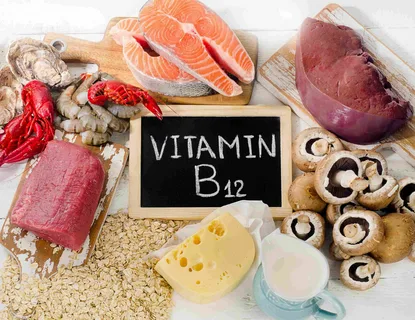Vitamin B12, also known as cobalamin, is an essential nutrient that plays a crucial role in various bodily functions, including red blood cell formation, nerve function, and DNA synthesis. Unlike many other vitamins, B12 is primarily found in animal products, making it challenging for vegetarians and vegans to meet their recommended intake. This guide will explore various sources of vitamin B12, dietary recommendations, supplements, and common questions about ensuring an adequate B12 intake.
Understanding Vitamin B12
Vitamin B12 is a water-soluble vitamin that is vital for:
- Red blood cell formation: B12 is necessary for the production of healthy red blood cells, which transport oxygen throughout the body.
- Neurological function: It helps maintain the health of nerves and supports brain function.
- DNA synthesis: B12 is involved in the synthesis of DNA, the genetic material in all cells.
The recommended dietary intake of vitamin B12 varies by age and life stage but generally ranges from 2.4 micrograms (mcg) per day for adults to higher amounts for pregnant and breastfeeding women.
Sources of Vitamin B12
Vitamin B12 is naturally found in animal products, including:
- Meat: Beef, pork, lamb, and poultry.
- Fish and seafood: Trout, salmon, tuna, shrimp, and clams.
- Dairy products: Milk, cheese, and yogurt.
- Eggs: Especially the yolks.
For vegetarians and vegans, sources of vitamin B12 include:
- Fortified foods: Some plant-based milk alternatives, breakfast cereals, and nutritional yeast are fortified with B12.
- Supplements: Vitamin B12 supplements are widely available and come in various forms, including tablets, capsules, and sublingual (under the tongue) drops.
How to Incorporate More Vitamin B12 into Your Diet
To ensure an adequate intake of vitamin B12, consider the following tips:
- Eat animal products: Include meat, fish, dairy, and eggs in your diet regularly.
- Choose fortified foods: Opt for fortified plant-based milk, cereals, and nutritional yeast.
- Consider supplements: If you follow a vegan or vegetarian diet, or if you have difficulty absorbing B12 from food, consider taking a B12 supplement.
- Read labels: Check food labels to identify products that are fortified with vitamin B12.
Cooking Tips for Preserving Vitamin B12
Vitamin B12 is sensitive to heat and light. To retain as much B12 as possible when cooking:
- Cook meats and fish gently: Avoid prolonged exposure to high temperatures.
- Limit cooking time: Cook foods quickly and avoid overcooking.
- Store foods properly: Store meat, fish, and dairy products in cool, dark places to preserve their B12 content.
FAQs About Getting More Vitamin B12
What are the symptoms of vitamin B12 deficiency?
Symptoms of vitamin B12 deficiency can include fatigue, weakness, numbness or tingling in hands and feet, difficulty walking, memory problems, and mood changes.
How can vegetarians and vegans get enough vitamin B12?
Vegetarians can obtain vitamin B12 from dairy products and eggs. Vegans should rely on fortified foods or supplements to meet their B12 needs.
Are there any health risks associated with too much vitamin B12?
Excess vitamin B12 is typically excreted by the body, so there is generally no risk of toxicity from consuming too much B12 through food or supplements.
Can I get enough vitamin B12 from plant sources alone?
No, vitamin B12 is primarily found in animal products. Plant sources may be fortified with B12, but they alone are not sufficient for meeting daily requirements without fortified foods or supplements.
How does age affect vitamin B12 absorption?
As people age, their ability to absorb vitamin B12 from food decreases. Older adults may need to consume more B12-rich foods or supplements to maintain adequate levels.
Should I take a vitamin B12 supplement if I eat meat regularly?
If you consume meat regularly, you are likely getting enough vitamin B12 from your diet alone. However, if you have concerns about your B12 intake or absorption, consult with a healthcare professional.
What is the difference between methylcobalamin and cyanocobalamin?
Methylcobalamin and cyanocobalamin are different forms of vitamin B12. Methylcobalamin is often preferred because it is the form used in the body’s biochemical processes, whereas cyanocobalamin is a synthetic form that converts to methylcobalamin in the body.
Can I get vitamin B12 from nutritional yeast?
Nutritional yeast is a source of fortified vitamin B12 for vegans and vegetarians. Check the label to ensure it is fortified with B12, as not all nutritional yeast products contain significant amounts of the vitamin.
How can I tell if a food is fortified with vitamin B12?
Check the nutrition label on the packaging. Fortified foods will typically list vitamin B12 as an ingredient, along with the amount per serving.
Are there any medications that can interfere with vitamin B12 absorption?
Certain medications, such as proton pump inhibitors (PPIs) used to treat acid reflux, and metformin used to treat diabetes, can reduce vitamin B12 absorption. If you take these medications regularly, talk to your healthcare provider about monitoring your B12 levels.
Conclusion
Ensuring an adequate intake of vitamin B12 is essential for overall health and well-being. Whether you consume animal products or follow a vegetarian or vegan diet, there are various ways to incorporate B12 into your daily meals. By choosing B12-rich foods, fortified products, and supplements as needed, you can maintain optimal B12 levels and support your body’s vital functions. If you have specific concerns about your B12 intake or absorption, consult with a healthcare professional for personalized advice.

